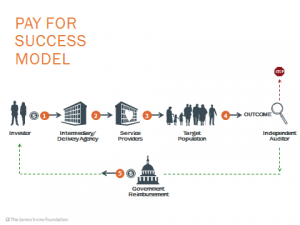Over the past few years, we’ve seen “Pay for Success” evolve from a buzz-word (with a sky-high word to action ratio!) to a concept that is being explored and implemented across the country.
Pay for Success (sometimes referred to as “social impact bonds”) is an approach to funding social services to scale and provide new funding to programs that produce positive outcomes and ultimately reduce costs. In a Pay for Success agreement, private investors provide funding for preventative or interventional services up-front, and government reimburses these investors with a return on their investment, only if results are achieved.
In doing so, private investors take on initial risk, governments only pay for successful outcomes, and cost-saving programs with demonstrated effectiveness have access to new funding from private sources to scale high-impact projects.
Pay for Success is not a quick fix for strained social services budgets. It requires service providers to change the ways they work with funders and how they measure impact. It requires governments and investors to work together in different ways to scale programs that are good for society and benefit us all by preventing the need for more costly, remediation services in the future. Those changes take time, money and expertise to achieve.
At Nonprofit Finance Fund, we’re currently working on a Pay for Success Initiative in California, funded by the James Irvine Foundation. The Initiative provides flexible funding and technical assistance with the goal of helping nonprofit and government leaders structure Pay for Success agreements in California over the next two years. Participants will form an active learning cohort to share their experiences, challenges and results in this work.
Here’s a look at the participants that offers a window into how Pay for Success may ultimately transform the way we as a society approach some of our most pressing challenges:
- Center for Employment Opportunities (CEO) and REDF
CEO and REDF are working to reduce recidivism and improve employment outcomes for formerly incarcerated individuals in San Diego County. Using life skills training, transitional work programs, job-placement assistance, and post-placement job counseling among high-risk probationers in San Diego County, CEO’s intervention targets the highest risk men and women coming home from incarceration to help with work entry. Already engaged as the service provider on a Pay for Success project in New York, CEO looks to scale its programs and leverage REDF’s expertise in social enterprise and workforce development within the state.
- County of Los Angeles
The County of Los Angeles is developing a blueprint that will serve as a roadmap for County executives in the selection of high-impact interventions. It will address administrative and contracting issues, highlight potential risk and mitigating factors as well as financial considerations that need to be addressed prior to launching any Pay for Success project.
- City and County of San Francisco
The City and County of San Francisco is analyzing how the Pay for Success model could enable greater focus on preventative services that is aligned with the Mayor’s strategic priorities in workforce development, housing, public health and human services. Pay for Success presents an opportunity to address these key issues in an even more efficient way, reduce a portion of the higher costs of remediation services and provide better outcomes to individuals and communities. Jointly led by the Office of the Mayor and the Controller’s Office of Public Finance, this project has secured the support of several partner agencies within the City and County, local community partners and technical assistance providers.
- County of Santa Clara
The County of Santa Clara is pursuing two projects to reduce suffering and increase wellness for vulnerable populations—the chronically homeless and the acutely mentally ill. The program for the County’s chronically homeless population aims to provide 100 units of permanent supportive housing and supportive care over the next six years. The program for those with acute mental illness is geared toward providing quality care in a timely and effective manner. The County is in an advanced stage of project readiness, having already completed initial feasibility studies and landscape and cost-benefit analyses focused on how private financing can be leveraged to effectively utilize tax dollars and deliver significant social outcomes.
- Nurse-Family Partnership (NFP)
NFP is an evidence-based program that supports first-time mothers living in poverty by pairing them with a nurse who provides home visits from early in pregnancy until the child’s second birthday. The goal of the program is to improve pregnancy outcomes, child health and development, and life course development for the clients and their families. Drawing upon over a decade of field implementation and a national presence, NFP has demonstrated the ability to achieve improved pregnancy, child health and development, and family self-sufficiency outcomes, as well as significant government savings by supporting parents’ instincts to protect their children.
As we, as a society, look for new ways to sustain positive social change, Pay for Success presents a complex but compelling alternative to current approaches. Our hope is that the successes and challenges of participants in this initiative will also help others move from concept to implementation, and ultimately, the realization of the benefits of this model.
Jessica LaBarbera serves as Director, Strategic Innovation at Nonprofit Finance Fund (NFF) and in that role primarily focuses on supporting evolutions in the social impact investing space in addition to managing special initiatives and leading strategic consulting work with nonprofit clients.



